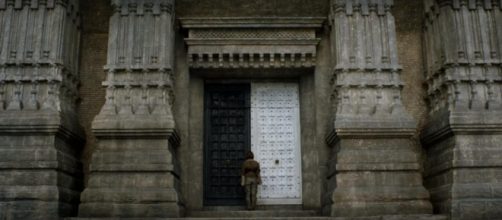"Valar Morghulis," an ominous Faceless Men motto, has been staring us in the face ever since "Game of Thrones" Season 2, Episode 10 when Jaqen H'ghar told Arya the words after he gave her "the coin of great value" and instructed her to give the coin to any man from Braavos. And it wasn't long until we found out that "Valar Morghulis" is actually a High Valyrian term for "all men must die." Having these words as their motto comes as no surprise given the fact that the Faceless Men are, after all, a cult of assassins who worship "The Many-Faced God," also known as the god of death.
For the Faceless Men, death is a gift from "The Many-Faced God", which they are willing to give people, for a very high price. But what if there is more to the Faceless Men than meets the eye? And what if their true purpose is hiding in plain sight, in the very words they are so keen on using? What follows is a theory on the true meaning of "Valar Morghulis" and how that ties into the events that led to the Great War that we are going to witness in "Game of Thrones" Season 8.
'Valar Morghulis': The truth hidden in plain sight
First of all, note that "Valar Morghulis" doesn't translate to "some men must die," which is something you would expect from the highly trained assassins who only kill when they are ordered to.
Instead, it says, "all men must die," which points to the fact that there is something far more nefarious going on with the Faceless Men than just killing for a price. And according to today's theory, the Faceless Men are just an instrument of the Children of the Forest whose goal is, as I theorized in a previous article, to get rid of mankind, which in other words means that all men (quite literally) must die. To further prove this connection, let's take a look at the history of the Faceless Men.
The Faceless Men: Origin story and the Doom of Valyria
It is said that the first Faceless Man gave the first gift of "The Many-Faced God" in the volcanic slave mines of Valyria to the most desperate slave and then later to the Valyrian masters as well.
According to Reddit user MrSilenceT, this man of "unknown origin" was not a man at all, but a member of the Children of the Forest, a non-human race who are known to live in dark corners of the earth -- places such as deep forests, caves, and mines.
"In exchange for having shared a bit of their magic and knowledge with these broken slaves," MrSilenceT writes, "the Children had acquired a legion of faithful servants that would later become the Faceless Men."
With this in mind, it wouldn't be too far-fetched to say that the Children of the Forest and the Faceless Men caused the Doom of Valyria, which is exactly what this theory is suggesting. The goal was to get rid of dragons and the powerful dragon lords that would be a major threat to the Night King invasion.
And for that same reason, they orchestrated the Tragedy at Summerhall, a fiery inferno that caused the deaths of King Aegon V Targaryen, his son, Prince Duncan the Small, and Ser Duncan the Tall, the Lord Commander of the Kingsguard, among many others, thus destroying any possibility of restoring dragons to the Seven Kingdoms.
The voice of The Many-Faced God
Despite the fact that the first Faceless Men appeared in the volcanic mines of Valyria, the cult itself wasn't found until centuries later in Braavos. They continued to obey "The Many-Faced God" whose voice was actually the voice of the Children of the Forest. "Valar Dohaeris," they would say -- "all men must serve."
When you think about it, the theory does make a lot of sense.
After all, "The Many-Faced God" sounds an awful lot like the many faces of Weirwood trees that the Children of the Forest worship as "old gods." Not to mention the fact that the door of the House of Black and White, the temple of "The Many-Faced God," is half made of Weirwood and that the sanctuary contains a pool of black water, similar to that in Winterfell. On top of that, there are fan theories that suggest that there is even a giant Weirwood tree in the House of Black and White.


